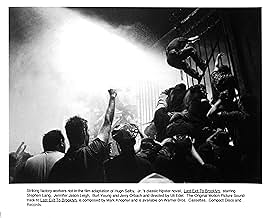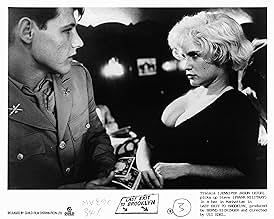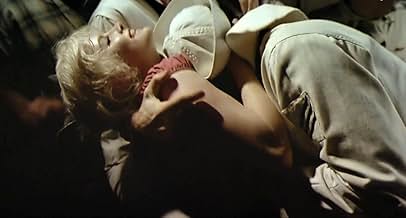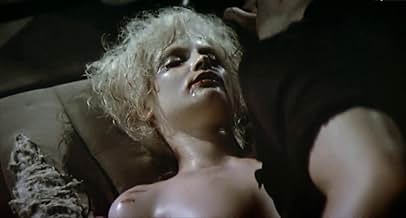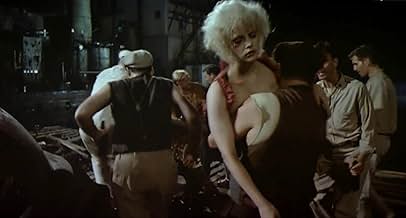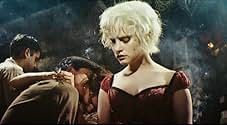IMDb-BEWERTUNG
6,8/10
7419
IHRE BEWERTUNG
Schauplatz war Brooklyn in den 1950er Jahren vor dem Hintergrund von Korruption und Gewalt in den Gewerkschaften. Eine Prostituierte verliebt sich in einen ihrer Kunden. Auch ein verstörter ... Alles lesenSchauplatz war Brooklyn in den 1950er Jahren vor dem Hintergrund von Korruption und Gewalt in den Gewerkschaften. Eine Prostituierte verliebt sich in einen ihrer Kunden. Auch ein verstörter Mann entdeckt, dass er homosexuell ist.Schauplatz war Brooklyn in den 1950er Jahren vor dem Hintergrund von Korruption und Gewalt in den Gewerkschaften. Eine Prostituierte verliebt sich in einen ihrer Kunden. Auch ein verstörter Mann entdeckt, dass er homosexuell ist.
- Regie
- Drehbuch
- Hauptbesetzung
- Auszeichnungen
- 6 Gewinne & 1 Nominierung insgesamt
Frank Acciarito
- Eddie
- (as Frank Acciarto)
Empfohlene Bewertungen
Did you ever notice that if you were to show a film to after dinner friends, all too often what you bring out is a work that might not make a list of your personal top ten favorite movies? This is one of those films. Very postwar early 50's, but a 1950's Donna Reed would have been lost in. It truly is the opposite of Pleasantville.
Hubert Selby's dark vision of the common man is woven around several characters in a Brooklyn neighborhood. A factory worker called Big Joe is played by Burt Young. Instinctively brutal yet pathetically naive, he wanders through his Brooklyn neighborhood functioning at the most elemental level reinforced only by an inherited value system to which he is single-mindedly loyal. Jennifer Jason Leigh plays a whore whose timeline for thoughts of her future stretches out only several hours. She gets by in life rolling drunks whose tolerance for liquor is less than hers, or giving sex to those who outlast her. A soldier soon to be shipped out takes her to Manhattan for his last few stateside days and falls in love with her. Tralala (Leigh's character) recognizes the attendant lust but has no clue about the implications of his love. As she sees him off, the Lieutenant hands her an envelope. Tra's face lights up as her vision of the order in life (she gives him sex, he has a good time, he gives her money) seems to have been reaffirmed. When the envelope turns out to contain a lengthy love letter she doesn't become angry or disappointed, just confused.
In addition to Leigh and Young, powerful performances are turned in by Jerry Orbach (the corrupt union boss), Stephen Lang (the closet homosexual strike-line foreman), Stephen Baldwin (a street punk), Ricki Lake (Big Joe's very pregnant daughter), and Alexis Arquette (the teen-age transvestite).
The soundtrack is excellent and unobtrusive and Uli Edel's direction insightful. You need a strong stomach to watch it and quite a bit of dedication to find it, but it's well worth the effort.
Hubert Selby's dark vision of the common man is woven around several characters in a Brooklyn neighborhood. A factory worker called Big Joe is played by Burt Young. Instinctively brutal yet pathetically naive, he wanders through his Brooklyn neighborhood functioning at the most elemental level reinforced only by an inherited value system to which he is single-mindedly loyal. Jennifer Jason Leigh plays a whore whose timeline for thoughts of her future stretches out only several hours. She gets by in life rolling drunks whose tolerance for liquor is less than hers, or giving sex to those who outlast her. A soldier soon to be shipped out takes her to Manhattan for his last few stateside days and falls in love with her. Tralala (Leigh's character) recognizes the attendant lust but has no clue about the implications of his love. As she sees him off, the Lieutenant hands her an envelope. Tra's face lights up as her vision of the order in life (she gives him sex, he has a good time, he gives her money) seems to have been reaffirmed. When the envelope turns out to contain a lengthy love letter she doesn't become angry or disappointed, just confused.
In addition to Leigh and Young, powerful performances are turned in by Jerry Orbach (the corrupt union boss), Stephen Lang (the closet homosexual strike-line foreman), Stephen Baldwin (a street punk), Ricki Lake (Big Joe's very pregnant daughter), and Alexis Arquette (the teen-age transvestite).
The soundtrack is excellent and unobtrusive and Uli Edel's direction insightful. You need a strong stomach to watch it and quite a bit of dedication to find it, but it's well worth the effort.
I remember my intense eagerness to see this film. I wasn't entirely sure why at the time but when I finally saw it in 1990 I was devastated and soon addicted to this sad tale of city life spiralling out of control. Its a film with an epic quality and a grand, sweeping style that turns the city scape into a character in itself. This was Uli Edel's (as he was then known) classic and it remains a remarkably strong film. Its not pretty and doesn't hold back in revealing the light and dark of its characters. Brutal it may be, but there is something vital and alive seething in this movie with anger and pain. Its source is Hubert Selby Jr's novel. I believe its a superior adaptation.
The film is based around a union strike which threatens to cripple the city of Brooklyn in the 1950s. The film focuses several characters; Harry, the troubled union leader struggling to come to terms with his desires for other men and his gender-bending lover against the anger, aggression and hypocrisy of the era; a woman, TraLaLa, who sells her body for money but finds herself committing the ultimate crime of her profession by falling for a client - an army man destined to hurt her; a family with a daughter pregnant out of wedlock; a gang of aimless young men hungry for trouble; and a young teen looking for love in TraLaLa.
Its a film full of fascinating performances which reinforce the greatness of this film. Jennifer Jason Leigh burst into the spotlight with her startling performance as TraLaLa. She embodies the role with unceasing honesty and vigour. It is her late scenes in the film which rip at the heart, especially when she finds compassion in an unlikely source at the worst of moments. Her portrayal doesn't seek sympathy - on the contrary Jennifer Jason Leigh gets deep inside the cruel and manipulative character to reveal the hope beneath without a false note. Peter Dobson, Stephen Baldwin are a brilliant combination as the thugs and Alexis Arquette is remarkable as their taunted worshipper, Georgette. Ricki Lake, Sam Rockwell and Stephen lang also excel in a great ensemble film.
I can still picture vividly the majesty and intensity of the strike riot and the water spraying at the wire fence as strikers confront the police.
There are many great scenes such as this which combined with striking performances and an unflinching script and score make Last Exit to Brooklyn a modern masterpiece. This is a highly underrated film, mainly because of the view that the subject matter is too seamy, grotesque and extreme. And there is no doubt this is a confronting, violent and provocative film experience. Unfortunately, because of this widely heralded view, many people are missing out on an unacknowledged classic. Don't miss out.
The film is based around a union strike which threatens to cripple the city of Brooklyn in the 1950s. The film focuses several characters; Harry, the troubled union leader struggling to come to terms with his desires for other men and his gender-bending lover against the anger, aggression and hypocrisy of the era; a woman, TraLaLa, who sells her body for money but finds herself committing the ultimate crime of her profession by falling for a client - an army man destined to hurt her; a family with a daughter pregnant out of wedlock; a gang of aimless young men hungry for trouble; and a young teen looking for love in TraLaLa.
Its a film full of fascinating performances which reinforce the greatness of this film. Jennifer Jason Leigh burst into the spotlight with her startling performance as TraLaLa. She embodies the role with unceasing honesty and vigour. It is her late scenes in the film which rip at the heart, especially when she finds compassion in an unlikely source at the worst of moments. Her portrayal doesn't seek sympathy - on the contrary Jennifer Jason Leigh gets deep inside the cruel and manipulative character to reveal the hope beneath without a false note. Peter Dobson, Stephen Baldwin are a brilliant combination as the thugs and Alexis Arquette is remarkable as their taunted worshipper, Georgette. Ricki Lake, Sam Rockwell and Stephen lang also excel in a great ensemble film.
I can still picture vividly the majesty and intensity of the strike riot and the water spraying at the wire fence as strikers confront the police.
There are many great scenes such as this which combined with striking performances and an unflinching script and score make Last Exit to Brooklyn a modern masterpiece. This is a highly underrated film, mainly because of the view that the subject matter is too seamy, grotesque and extreme. And there is no doubt this is a confronting, violent and provocative film experience. Unfortunately, because of this widely heralded view, many people are missing out on an unacknowledged classic. Don't miss out.
After being blown away by the film version of Requiem for a Dream, I recently began reading some of Selby's books. I started with The Room and moved on to Last Exit to Brooklyn. Tonight I watched the film.
I think it's very unfortunate that people have criticized it here for exactly the qualities that make it unique compared to most American films. Yes, it's dark, and yes, there are not always clear resolutions to every character's part of the story. Those are qualities present in Selby's book and it would have been a shame for the filmmakers to abandon them, just as it would have been a shame for Aronofsky to cave to the pressures to find a happier ending for his film of Requiem...
As a reader of the book I think those negative comments are even more misguided, because the screenwriter did quite a bit to try to make the material more accessible for the viewing audience. He intertwined what are essentially separate stories (the book is more like a collection of short stories around related themes than a traditional novel), and found what was probably the happiest ending possible given the material. The book doesn't end on the relief of the end of the strike, but finishes with an amazing coda that contains characters like Abraham, a man who spends money on clothes and his car but won't cough up to buy vitamins for his malnourished children.
My one big complaint about the screenplay was the treatment of Harry Black's character. In the book he is a largely ineffectual blowhard who is laughed at by almost everyone around him, but in the film he is almost heroic at times, leaping into the middle of the confrontation at the picket line. I think his descent is more credible in the book, but Selby was also able to get inside Harry's head on paper in a way that's difficult to translate into film.
Overall I think this film is a very excellent adaptation of extremely difficult material, and I recommend it to anyone who is willing to watch a story about the pain and suffering that happens in everyday life without the Hollywood gloss.
I think it's very unfortunate that people have criticized it here for exactly the qualities that make it unique compared to most American films. Yes, it's dark, and yes, there are not always clear resolutions to every character's part of the story. Those are qualities present in Selby's book and it would have been a shame for the filmmakers to abandon them, just as it would have been a shame for Aronofsky to cave to the pressures to find a happier ending for his film of Requiem...
As a reader of the book I think those negative comments are even more misguided, because the screenwriter did quite a bit to try to make the material more accessible for the viewing audience. He intertwined what are essentially separate stories (the book is more like a collection of short stories around related themes than a traditional novel), and found what was probably the happiest ending possible given the material. The book doesn't end on the relief of the end of the strike, but finishes with an amazing coda that contains characters like Abraham, a man who spends money on clothes and his car but won't cough up to buy vitamins for his malnourished children.
My one big complaint about the screenplay was the treatment of Harry Black's character. In the book he is a largely ineffectual blowhard who is laughed at by almost everyone around him, but in the film he is almost heroic at times, leaping into the middle of the confrontation at the picket line. I think his descent is more credible in the book, but Selby was also able to get inside Harry's head on paper in a way that's difficult to translate into film.
Overall I think this film is a very excellent adaptation of extremely difficult material, and I recommend it to anyone who is willing to watch a story about the pain and suffering that happens in everyday life without the Hollywood gloss.
Last Exit to Brooklyn (1989) is based on the book by Hubert Selby Jr. about a group of working class during a labour strike in early 1950's in the gritty streets of Brooklyn. German Uli Edel directed this and Desmond Nakano wrote the screenplay. Stephen Lang plays Harry Black, the leader of the strike unit and Jennifer Jason Leigh is Tralala, a lost soul who works as a hooker for the various soldiers and other drunken males that use the services of the hookers drinking beer and acting dirty. The film explores the forms of love and how desperate we are for it, because living without it is not too easy or even possible as it belongs to being a human being.
The film opens with a line from the Bible which thickens the theme of the film and the above thing I wrote. Soon we get introduced to the main characters who don't seem to be too happy. Harry doesn't care about his wife and child but seems to be very attracted by a sensual and very attractive transvestite who lives with other transvestites in their own apartment while the "straight" prostitutes are mainly in the streets. This relationship between Harry and the transvestite(s) is very great and emotional and depicts the nature of love and caring as it doesn't always involve just different sexes together. Just watching Harry's eyes when he first sees his new interest in the street shows how powerful cinema can be without one single word.
Another important character is of course Tralala and she is also involved in the film's harrowing and almost unbearably sadistic and ugly end scene that finally (or what happens after that) makes the film a very strong experience. She is completely lost even though she meets a nice sailor who truly falls in love with her even though Tralala doesn't understand it at once. She understands it during the end scene as well as the meaning of the crying boy she first gets to meet during the act. Last Exit to Brooklyn explores love and caring between human beings and how strong it can be. Tralala wouldn't survive without the motorcycle boy, or she would live the rest of her life in pure emptiness and void.
The film handles also violence and weak human nature desperate for sex and other of his instincts. The violence is very harsh and off putting and the film's view of life is dark to say the least. Violence is here as unjustified and brutal as in real life, too, and maybe that's why so many seem to dislike the film and its honesty saying it is "unpleasant and repellent".
The sets are very impressive and the atmosphere in this film is all the time like the actors could any minute start singing and dancing their lines! This creates also a very strong feel of danger and "clock ticking" as the workers and strikers wait for the decision by the authorities and it is like it is night all the time. The film feels like a depiction of the world's last day that still may not be the last but no one knows it yet for sure.
Equally great with the photography and sets is the music by Mark Knopfler. The beautiful theme is played during the film restrainedly and it makes the strong events and situations even stronger, as always a great soundtrack does. The very conclusion is pretty optimistic and again the music makes it look even brighter and hopeful. Some characters didn't manage to learn before it was too late, but at least those who did have a chance for a better tomorrow.
The major negative sides in the film are in the occasional restlessness as the writer tried to give us more information than it was necessary. I mean mostly the scenes involving Burt Young character's family tragedy with all its screaming and shouting and crying. These scenes are not too powerful but more irritating as they could have been different. The characters' motivations are not always clear and sometimes they seem to develop too fast. What they tried to express through screaming and horrible noise should have been done more aesthetically and with the tools of the art and much more effectively.
Last Exit to Brooklyn is a powerful, challenging and at the end, beautiful film about the most important and universal things in life and about humanity, and it is also a great film visually. This is very powerful drama and only few steps from being a nearly perfect masterpiece. 8/10
The film opens with a line from the Bible which thickens the theme of the film and the above thing I wrote. Soon we get introduced to the main characters who don't seem to be too happy. Harry doesn't care about his wife and child but seems to be very attracted by a sensual and very attractive transvestite who lives with other transvestites in their own apartment while the "straight" prostitutes are mainly in the streets. This relationship between Harry and the transvestite(s) is very great and emotional and depicts the nature of love and caring as it doesn't always involve just different sexes together. Just watching Harry's eyes when he first sees his new interest in the street shows how powerful cinema can be without one single word.
Another important character is of course Tralala and she is also involved in the film's harrowing and almost unbearably sadistic and ugly end scene that finally (or what happens after that) makes the film a very strong experience. She is completely lost even though she meets a nice sailor who truly falls in love with her even though Tralala doesn't understand it at once. She understands it during the end scene as well as the meaning of the crying boy she first gets to meet during the act. Last Exit to Brooklyn explores love and caring between human beings and how strong it can be. Tralala wouldn't survive without the motorcycle boy, or she would live the rest of her life in pure emptiness and void.
The film handles also violence and weak human nature desperate for sex and other of his instincts. The violence is very harsh and off putting and the film's view of life is dark to say the least. Violence is here as unjustified and brutal as in real life, too, and maybe that's why so many seem to dislike the film and its honesty saying it is "unpleasant and repellent".
The sets are very impressive and the atmosphere in this film is all the time like the actors could any minute start singing and dancing their lines! This creates also a very strong feel of danger and "clock ticking" as the workers and strikers wait for the decision by the authorities and it is like it is night all the time. The film feels like a depiction of the world's last day that still may not be the last but no one knows it yet for sure.
Equally great with the photography and sets is the music by Mark Knopfler. The beautiful theme is played during the film restrainedly and it makes the strong events and situations even stronger, as always a great soundtrack does. The very conclusion is pretty optimistic and again the music makes it look even brighter and hopeful. Some characters didn't manage to learn before it was too late, but at least those who did have a chance for a better tomorrow.
The major negative sides in the film are in the occasional restlessness as the writer tried to give us more information than it was necessary. I mean mostly the scenes involving Burt Young character's family tragedy with all its screaming and shouting and crying. These scenes are not too powerful but more irritating as they could have been different. The characters' motivations are not always clear and sometimes they seem to develop too fast. What they tried to express through screaming and horrible noise should have been done more aesthetically and with the tools of the art and much more effectively.
Last Exit to Brooklyn is a powerful, challenging and at the end, beautiful film about the most important and universal things in life and about humanity, and it is also a great film visually. This is very powerful drama and only few steps from being a nearly perfect masterpiece. 8/10
Mark Knopfler's beautiful and melancholy score paints a haunting and pained picture, over this, an extremely hard-hitting drama, superbly directed by Uli Edel.
For 1989, its release date and set around Brooklyn in the 1952, this is as strong as films got. The "C" word, rape scenes, florid homosexuality and sexual violence - from a novel (by Hubert Selby jnr) that was initially banned under the Obscene Publications Act.
So, why watch it? There's a sense of brooding beauty about it, in the same way that West Side Story had flawed characters, in so many conflicts, within their own community and incomers, such as military servicemen, at night, looking for a great time. Enter busty, platinum blonde and cocky Jennifer Jason Leigh, who gets men in bars buying her drinks, leads them out for some 'fun' and then her mates bash him round the head with a bottle. Grabbing the money, they're just those hoodlums from west Side...just older, doing worse things.
Stephen Lang, meanwhile, is the shop steward for a union, that's called its dockside workers out. He's raking in on expenses, for things he doesn't even need. He's got a wife and baby, but leaves them at night to go out with Regina (actually, Reginald) a camp gay and his bitching transvestite buddies.
As you can see, this is strictly for adults and no, I haven't read the book. A friend I lent the DVD to, who's read all manner of literature, from the classics to strong stuff like this, just said "Wow".
It's a memorable and distinctive film. Not one that's known, either commercially, or infamously. It doesn't seem to get bundled up with the likes of Natural Born Killers or A Clockwork Orange. Maybe cos it has a heart; a survivoral instinct that's most apparent in the Italian families in the film, headed by Burt Young, who of course played Paulie, Rocky Balboa's wheezing training aide, in the Rocky movies.
My Universal release has a fine transfer and is quite cheap, especially secondhand. So, if you want something pretty edgy, but with a heart and a pulse, this could end up in your player.
For 1989, its release date and set around Brooklyn in the 1952, this is as strong as films got. The "C" word, rape scenes, florid homosexuality and sexual violence - from a novel (by Hubert Selby jnr) that was initially banned under the Obscene Publications Act.
So, why watch it? There's a sense of brooding beauty about it, in the same way that West Side Story had flawed characters, in so many conflicts, within their own community and incomers, such as military servicemen, at night, looking for a great time. Enter busty, platinum blonde and cocky Jennifer Jason Leigh, who gets men in bars buying her drinks, leads them out for some 'fun' and then her mates bash him round the head with a bottle. Grabbing the money, they're just those hoodlums from west Side...just older, doing worse things.
Stephen Lang, meanwhile, is the shop steward for a union, that's called its dockside workers out. He's raking in on expenses, for things he doesn't even need. He's got a wife and baby, but leaves them at night to go out with Regina (actually, Reginald) a camp gay and his bitching transvestite buddies.
As you can see, this is strictly for adults and no, I haven't read the book. A friend I lent the DVD to, who's read all manner of literature, from the classics to strong stuff like this, just said "Wow".
It's a memorable and distinctive film. Not one that's known, either commercially, or infamously. It doesn't seem to get bundled up with the likes of Natural Born Killers or A Clockwork Orange. Maybe cos it has a heart; a survivoral instinct that's most apparent in the Italian families in the film, headed by Burt Young, who of course played Paulie, Rocky Balboa's wheezing training aide, in the Rocky movies.
My Universal release has a fine transfer and is quite cheap, especially secondhand. So, if you want something pretty edgy, but with a heart and a pulse, this could end up in your player.
Wusstest du schon
- WissenswertesRalph Bakshi had made a previous attempt to direct the film, a production he was to co-produce with Steve Krantz and author Hubert Selby Jr. Actor Robert De Niro accepted a major role in the film. However, the project fell apart when Bakshi and Krantz had a falling out. Bakshi and Selby became friends, and, according to Bakshi, they "tried a few other screenplays after that on other subjects, but I could not shake Last Exit from my mind."
- SoundtracksBe Ba-ba Le-ba
Written and Performed by Helen Humes
Courtesy of CEMA Special Markets/EMI Records, Inc.
Top-Auswahl
Melde dich zum Bewerten an und greife auf die Watchlist für personalisierte Empfehlungen zu.
- How long is Last Exit to Brooklyn?Powered by Alexa
Details
- Erscheinungsdatum
- Herkunftsländer
- Sprache
- Auch bekannt als
- Last Exit to Brooklyn
- Drehorte
- Produktionsfirmen
- Weitere beteiligte Unternehmen bei IMDbPro anzeigen
Box Office
- Bruttoertrag in den USA und Kanada
- 1.730.005 $
- Eröffnungswochenende in den USA und in Kanada
- 186.489 $
- 6. Mai 1990
- Weltweiter Bruttoertrag
- 1.730.005 $
- Laufzeit
- 1 Std. 42 Min.(102 min)
- Farbe
- Seitenverhältnis
- 1.85 : 1
Zu dieser Seite beitragen
Bearbeitung vorschlagen oder fehlenden Inhalt hinzufügen


